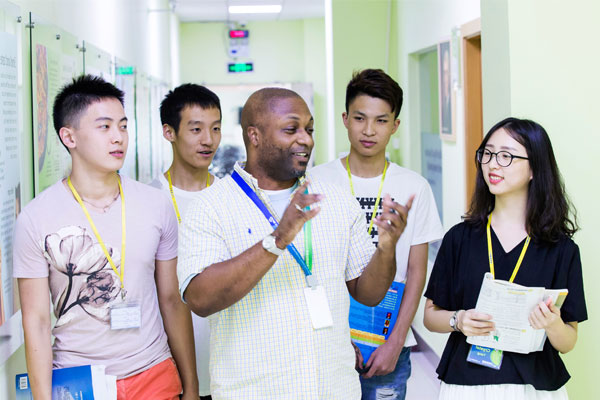出国面签,口语不过关,
面试官的脸说黑就黑!
国际贸易,沟通不顺畅,
天价订单说飞就飞!
人在职场,英语不行,
升职加薪无望!
封闭式管理,纯英语环境,采用『浸泡式』学习法,
按测试水平入学分班,小班教学。
英语是唯一的
校内通行语言,力求每位学员在较短的时间
内真正
内化英语,实现流利英语脱口而出的梦想。
“与世隔绝”,Sorry!
这段时间我只与英语作伴!
衣食住学 English Only,
听说训练满分 Get!
纯英语环境,
厨房大叔和清洁阿姨都能飚英语!
 名中外教,打造国际文化氛围!
名中外教,打造国际文化氛围!
具备丰富教学经验的外教团队,
教师来自十几个国家,均持有外国专家证书及 TESOL 国际教师资格证,
融英语教学于生活, 营造浓郁国际文化氛围,
让您在这小小的联合国中尽情享受异国风情和多元文化交融之体验。

|

|

|

|

|
了解更多国际师资

allocate, separate, detach, divide
allocate v.分配,把……拨给。
The city government allocated money for schools and the police in this year's budget.市政府在今年的预算中给学校和警察部门分配了资金。
separate v.人为地分开,使隔离开。
We separated the salad forks from the dinner forks.我们把沙拉叉与餐叉分隔开。
detach v.拆开组合的物体;远离,疏远。
We need a carpenter to detach this bookshelf from the wall.我们需要一名木匠将书架从墙上拆下来。
divide v.指将整体分为若干个部分。
The huge corporation divided into smaller companies.这家特大公司分成一些较小的公司。
amplify, enlarge, stretch, magnify, reinforce, expand
amplify v.扩大,增加,尤其指通过增强电压或电流使声音扩大;补充叙述(故事、事件等)。
We must ask you to amplify your statement.我们得请你对你的说法作进一步的说明。
enlarge v.扩大,多指具体物品如相片的放大。
enlarge photograph放大照片
enlarge a house扩建房屋
stretch v. (有弹性地)伸展,延伸,并有可能超过限度;伸长、伸出(身体某部位)并绷紧肌肉(尤指在放松后或为了够着某物)。
The pullover stretched after I had worn it a few times.这件套头毛衣我穿了几次之后就撑大了。
Having finished their morning work, the clerks stood up behind their desks, stretching themselves.完成了早间工作之后,职员们站到桌子后面伸伸懒腰。
magnify v.放大,指用透镜或显微镜使物体看上去大一些。
His eyeglasses magnify words so he can read them.他借助眼镜把字放大以便能够阅读。
reinforce v.增援,加固。
expand v.指范围、体积的扩大、增大,也可以指内容或细节的充实。
The balloon expanded, then exploded.气球先是膨胀,然后就爆破了。
anger, fury, indignation, resentment
anger n.气愤,生气,是一般用语。
After their argument, he expressed his anger by punching the other man in the face.争吵之后,他一拳打在那个人的脸上以发泄怒气。
fury n.暴怒,大怒,程度较anger要强。
indignation n.义愤,尤其指出于道义上的激愤。
Arise / arouse / attract general indignation at the sudden steep rise in bus fares公共汽车票价突然猛增激起的公愤
resentment n.愤恨,怨恨,不满,是正式用语,尤指由于受侮辱或自尊心受到伤害后而产生的愤慨。
There was a feeling of resentment in the office after everyone's pay was lowered.大家的工资降低后,办公室里怨声载道。
apparent, evident, manifest, obvious, distinct
apparent a.明显的,显而易见的,尤其指容易观察到或认识到的事物。
He is very unhappy, and it is apparent that he wants to leave now.他很不高兴,显然他现在想走了。
evident a.明白的,明显的,与apparent基本同意,多用于推理或由事实证明的事物。
It is evident that he is guilty; his fingerprints were found at the crime scene.显然他是有罪的,在犯罪现场发现了他的指纹。
manifest a.清楚的,明显的,多指根据外部特征或迹象便能看出或了解其意义,常作表语。
Her ability is manifest, but she is not attractive.她才能出众,但长相并不动人。
obvious a.明显的,显而易见的,含有无可辩白,不需证明之意。
It is obvious that woman has had too much to drink.很显然,那个妇女酒喝的太多了。
distinct a.清楚的,明显的;不同的,独特的。修饰性质明显不同的东西。
Medical care has made a distinct improvement in his health.治疗已使他的健康有了明显的好转。
applaud, clap, commend, praise
applaud v.鼓掌,赞扬,指因精湛表演或某种行为得到别人的赞许,大声叫好或热烈鼓掌。
The boss applauded my efforts by praising my work.老板表扬了我的工作,对我的努力表示赞许。
clap v.拍打,其用法是clap one's hand=applaud,不能说applaud one's hands。
clap sb.为某人鼓掌,clap sth.拍打某物
commend v.为正式用词,用于对具体功绩或成就表示嘉奖,通常指上级对下级、长辈对晚辈的赞赏。
The teacher commended the student for doing well on the exam.老师表扬学生们的考试成绩优异。
praise v.为一般用词,用于对某人的优秀品质表示钦佩羡慕;赞颂,赞美。
A supervisor praised the employee for her good work.一位主管称赞这位员工的工作做得不错。
Survivors of the crash praised God for saving them.坠机事件的幸存者赞颂上帝使他们得救。

 英语"666" 生活职场胜一筹
英语"666" 生活职场胜一筹